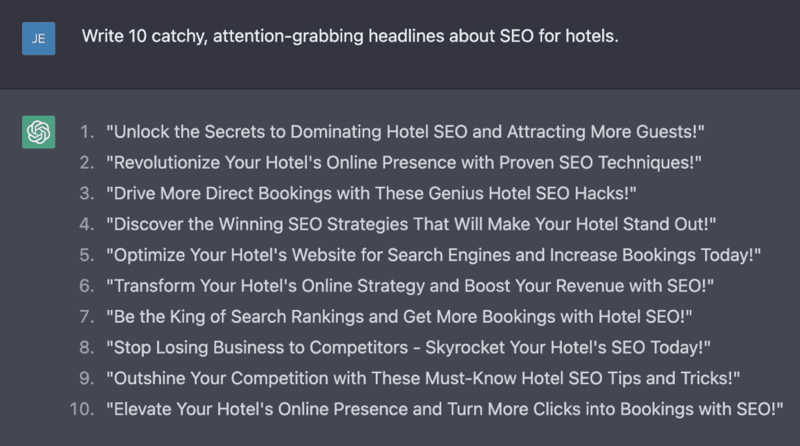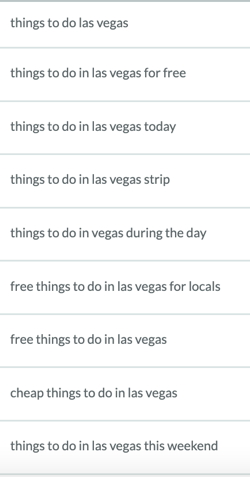

If you haven’t already, there’s still time to position your hotel SEO efforts for success in 2023. With new technologies, changing customer behaviors, and rising trends, hotel SEO strategies should be constantly evolving.
Align your SEO strategy with the following trends and SEO tips for hotels for 2023:
1. To ChatGPT or not to ChatGPT
AI-content generators have become a hot topic in the SEO world. And with search engine behemoths like Google and Bing cashing in on the AI-content generator train, things feel like they’re moving at lightning speeds.
But are AI-content generators a practical tool for hotel digital marketers that want to boost their hotel website’s organic rankings?
Google has already stated that websites “using automation—including AI—to generate content with the primary purpose of manipulating ranking in search results” is a violation of their spam policies. So, if your goal is to simply get indexed by Google, AI-generated content should be avoided.
However, there are ways you can use AI-content generators, such as ChatGPT, to potentially optimize your content workflow or even find new content topic ideas.
 Aside from some serious cheesiness, AI can be super helpful for smaller, menial tasks.
Aside from some serious cheesiness, AI can be super helpful for smaller, menial tasks.
Using AI-content generators for brainstorming, topic outlines, and inspiring creativity could be helpful time savers for busy hotel digital marketers. Generating title tags and meta descriptions are also solid uses of AI-content tools. Google has even stated that programmatic descriptions aren’t a guideline violation.
Of course, use AI-content generators with caution. ChatGPT is specifically programmed to predict the next word in a sentence, not to be accurate. Always double and triple check sources to ensure any AI-generated content is accurate.
Tom Demers at Search Engine Land has posted a handful of super helpful AI-oriented pieces that are worth a read. All-in-all, AI-generated content is a topic that all hotel digital marketers should be keeping an eye on as the year progresses.
2. Headless websites = faster websites
Since Google’s announcement that Core Web Vitals would become an organic ranking factor, we find that many hotel websites continue to fall behind from a page speed approach.
While we realize it can be tough juggling a healthy site speed while also trying to provide site visitors with a top-notch website experience through plugins, videos, and images, there’s a solution that carries major benefits for site visitors and site owners.

A Headless CMS is proven to improve page speed scores for critical Core Web Vitals metrics, as well as other important page speed metrics. And while this is great for site visitors, there are also benefits that will please website owners and developers like code conflict reduction, flexible programming language, and easier-to-manage hosting.
Get in touch with our hotel website design team for more details.
3. Answer all the questions
Like any online shopper, guests have questions. But if you can’t answer their questions, they’re likely going to choose an option that can. Frequently asked questions (FAQs) are a critical component of eliminating doubt and ensuring a smooth online booking process.
Simple FAQs like “what’s your cancellation policy?” and “what time is check-in?” should already be available and easy to find on your website. But you can also get super granular with your FAQs, especially if your hotel offers additional services and amenities like dining, extended stays, kids’ programs, etc.
To find those FAQs, you’ll need to do your own research. The following sources are a great place to start:
- Front desk team
- Housekeeping team
- Call center
- Dining team
- Activities team
- Check for trends in your online reviews
- Review the ‘Questions and answers’ field on your Google Business Profile and Bing Places listing
- Review your Google Search Console queries report
- Type your hotel name into Google and Bing and check for People Also Ask queries
Frequently asked questions should only be added to website pages that align with the question being asked. For example, questions about dining should be on the dining page, not the rooms page, and vice versa.
4. Write about the tangential topics
Tangential topics are considered topics that are closely related to or are relevant to your business offerings. For hotels, those are things travelers may be interested in when visiting your destination, like can’t miss attractions, unique dining experiences, and events and festivals.
What’s great about these topics is that you can get fairly granular with your research, meaning you’ll likely find a lot of new content opportunities. In the example below, there are several opportunities for writing unique, helpful content around things to do in Las Vegas.

This not only provides hotel digital marketers with a slew of new content opportunities but, when done right, can boost your hotel’s local SEO. This is where keyword research for hotels is crucial. Identify what people are searching for about your destination, then create unique, helpful content that answers the searcher’s query.
5. Don’t just post content, promote it
There’s an extra step in the content creation process that hotel digital marketers need to apply to their SEO strategies in 2023: content promotion. Sitting idle after publishing your new blog article isn’t going to cut it. Get as many eyes on your shiny new article through social media posts, email newsletters, and backlink outreach.
While social media posting and email newsletters won’t directly affect your organic rankings, they do have an indirect influence via potential backlink opportunities and introducing your content to a set of eyes that might have otherwise never seen the article.
6. Boost your organic SERP real estate
With Google’s ever-changing organic SERP ecosystem, making sure you’re visible on as many searches and in as many placements as possible is crucial. And if you’re not already present in the hotel metasearch space or the hotel PPC space, then you better be working on a foolproof organic search strategy.
Use Google’s Featured Snippets and People Also Ask elements to guide your content creation. These organic SERP features can help broaden your website’s reach and drive more organic traffic to your website.

Schema optimization will also provide an opportunity to take up as much SERP real estate as possible. Wrapping your FAQs in schema markup is another great way to enhance your website’s chances of earning more SERP real estate. In the screenshot below, Google pulls the page’s schema-wrapped FAQs into the SERP and the dropdown function reveals the answers. Internal links can also be added to the answers, introducing another click opportunity to your website.

7. Always be tracking
“Always be testing” is a tried-and-true phrase at TravelBoom. It’s how we improve performance for client websites and digital marketing campaigns. But before you test anything, you should be tracking everything.
From channel attribution to e-commerce revenue and from keyword tracking to backlink profiles, making sure your hotel’s website and digital campaign tracking/analytics is in order is the most important thing you can do in 2023. And there’s no better time to get your tracking in order than before July 2023, when Google will sunset Universal Analytics and completely transition to GA4 for website analytics.
Learn more about our hotel data analysis services so we can help you with the GA4 transition.
Tap into these SEO tips and trends for 2023
- Improve your content workflow with AI
- Make your website faster
- Add FAQs to your website
- Write tangential content
- Promote your content
- Boost your SERP real estate
- Get your website and campaign tracking/analytics in order
Reach out for a free digital marketing evaluation of your hotel’s website and online efforts.
About TravelBoom Marketing
TravelBoom specializes in developing and executing customized data-driven marketing solutions that drive direct bookings and growth for its clients. With over 25 years of experience in digital marketing for travel and hotels, TravelBoom leverages advanced data science and analytics to uncover insights and develop strategies that greatly enhance results for our clients and reduce reliance on third-party channels. TravelBoom is also host of the world’s #1 ranked Hotel Marketing Podcast and its quarterly Traveler Sentiment Study both of which can be found at www.travelboommarketing.com.